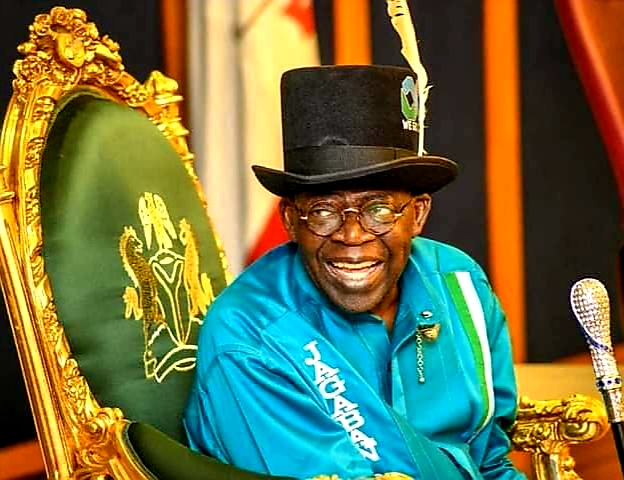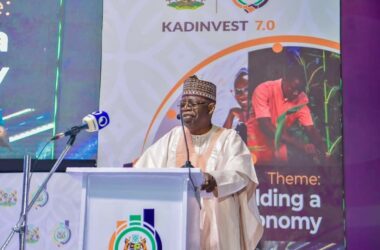Jagaban is the title given to him by the Borgu Kingdom, which is also a variant of Asiwaju, another chieftain title bestowed on Bola Ahmed Tinubu, Nigeria’s President-Elect, who recently coasted to victory on the heels of heated controversy and intense push-back by political rivals.
Bola Ahmed Tinubu is also called the Akinrogun of Lagos, the Agba-Akin of Ikorodu and, in all fairness, his determination has proven to be as steely as his titles sound. Judging by the string of hard-won battles in his political career, especially given that he has never tasted defeat at the ballot box, it doesn’t seem like “loss” is a concept that Bola Ahmed Tinubu, fondly called by his chieftain title — Asiwaju, relates with. Recently, Bola Ahmed Tinubu added one more title to his list of accomplishments: President-elect of Nigeria, and his victory marks a seismic shift in Nigerian politics, cementing his status as one of the most formidable political strategists in the country. With his birthday approaching, there could be no greater gift than this historic victory for the kingmaker now turned king.
It’s given that his victory was doubted initially as likely. Critics said he was too old, too divisive, and too corrupt to attain Nigeria’s highest political office and, worse, to be deemed fit for such a portfolio. However, Bola Ahmed Tinubu wouldn’t heed naysayers, and would, eventually, silence critics with his recent victory. His journey to Aso Rock – Nigeria’s seat of the President — has been marked by highs and lows, triumphs and setbacks, but through it all, Tinubu has remained a force to be reckoned with and, whatever opinion you have of the man, you can’t downplay the fact that he has remained consistent and committed to his ambition. And there’s a lot to learn from that.
Bola Ahmed Tinubu was born on 29 March 1952 to Abibatu Mogaji, a renowned trader in the city’s popular Balogun Market. He received his early education at St. Paul’s Primary School, Aroloya, Lagos, and Children’s Home School in Ibadan. In his quest for higher education, he traveled to the United States and earned a Bachelor’s degree in Business Administration from Chicago State University and a Master’s degree in Accounting from the University of Chicago. After completing his education, he returned to Nigeria in the late 1970s and worked in various companies, including Mobil Oil Nigeria, before venturing into politics.
He began his political journey in the 1990s and quickly climbed the political ranks, ultimately becoming the Governor of Lagos State in 1999. On January 9, 2022, he announced his intention to run for the office of the Nigerian president , and on March 1, 2023, he was declared the winner of the 2023 presidential elections by the Independent National Electoral Commission of Nigeria (INEC). This particular victory is a significant achievement for him, as it marks the culmination of his long-term political ambitions.
Tinubu’s foray into politics dates back to 1992, when he joined the Social Democratic Party and became a member of the Peoples Front faction led by Shehu Musa Yar’Adua, alongside other politicians such as Dapo Sarumi, Abdullahi Aliyu Sumaila, Rabiu Kwankwaso, and Yomi Edu. In the short-lived Nigerian Third Republic, he was elected to the Senate and represented the Lagos West constituency. Tinubu quickly gained a reputation as an effective organizer and strategist. Additionally, he was a key player in the June 12, 1993, elections, which were widely regarded as the freest and fairest elections in Nigeria’s history. Although the elections were annulled by the military government of the time, Tinubu continued to fight for democracy and good governance in Nigeria. He went into exile in 1994 and returned to Nigeria in 1998 after the death of military dictator General Sani Abacha, which led to an eventual transition to civilian rule.
In the build-up to the 1999 elections, Bola Tinubu was a protégé of Alliance for Democracy (AD) leaders Abraham Adesanya and Ayo Adebanjo. He contested and won the AD primaries for the Lagos State gubernatorial elections, beating Funsho Williams and Wahab Dosunmu, a former Minister of Works and Housing. In January 1999, Tinubu ran for Governor of Lagos State under the banner of the Alliance for Democracy (AD) party. He campaigned on a platform of good governance, infrastructure development, education, healthcare, and poverty reduction. His campaign resonated with Lagosians, who were tired of the corruption and mismanagement that had characterized previous administrations. Upon assuming office in May 1999, Tinubu promised to provide 10,000 housing units for the poor, and during his eight-year tenure as governor, he made significant investments in education and initiated road construction projects to cater to the state’s fast-growing population, which earned him widespread popularity among Lagosians. In 2003, he was re-elected as Governor of Lagos State, and he continued to build on his record of achievement.
Tinubu founded the Action Congress of Nigeria (ACN) in 2006, which quickly became a major force in Nigerian politics. The ACN was a merger of several opposition parties in Nigeria, and it provided a strong platform for Tinubu’s political ambitions. Under his leadership, the ACN won several state governorships and established itself as a credible alternative to the ruling People’s Democratic Party (PDP). His leadership style is widely regarded as focused, innovative, and results-oriented.
Likewise, as an astute headhunter, he made significant strides in infrastructure development, education, and healthcare, poverty reduction – a stride made possible by his cabinet. Additionally, he seized the opportunity of stifled state income at the time, for core introspection on how Lagos could surge IGR (internally generated revenue). The response to this necessity culminated in several decisions that led to the creation of various government agencies, such as the Office of Public Defenders, Lagos State Traffic Management Authority (LASTMA) for enhanced traffic management; the Lagos Metropolitan Area Transport Authority (LAMATA) to plan and manage an integrated transportation master plan for Lagos; and the initiation of the revolutionary Bus Rapid Transit (BRT) scheme that has transformed the face of public transportation in Lagos State. He also oversaw the construction of several infrastructure projects that boosted living standards in the state, which include 55 bus stop shelters; the construction of 25.9km of median barriers to enforce lane discipline and improve travel time on major highways; fabrication and installation of 50,000 units various types of traffic signs to improve road safety; installation of at least 63 functional traffic lights at major road intersections among others in the transportation sector.
It’s worth mentioning that these milestones followed the appointment of seasoned cabinet members for the state ministries, and this is one of the leadership skills Tinubu is known for among careful observers of the polity: his penchant for headhunting the right administrators.
Tinubu’s leadership style is also characterized by his focus on human capital development. He made significant investments in education, and his policies led to an improvement in the quality of education in Lagos State. For example, under Tinubu’s leadership, Lagos State rehabilitated primary and secondary schools in all divisions of the state through the Schools Rehabilitation Programme; massively constructed school furniture and equipping of laboratories; provided free education in all public primary and secondary schools and issued bursaries for WAEC/NECO and internal examination fees which significantly mitigated school drop-out levels among Lagos residents.
Once again, Tinubu’s success in selecting the best candidates for key government positions cannot be overlooked. He has a keen eye for talent, and his ability to build successful alliances and coalitions has earned him the reputation as the “kingmaker” in Nigerian politics. He has been a major political sponsor, supporting various candidates and contributing to their rise to power. His influence is felt both at the state and national levels. One of Tinubu’s most notable political appointments and sponsorship was that of Babatunde Fashola. Fashola was appointed as the Chief of Staff under Tinubu’s administration and later became the Governor of Lagos State from 2007 to 2015. He was praised for his infrastructural development programs in the state and went on to become the Minister of Power, Works, and Housing under President Muhammadu Buhari. Furthermore, Akinwunmi Ambode was appointed as the Accountant-General of Lagos State under Tinubu’s administration and later became the Governor of Lagos State from 2015 to 2019. He was noted for his infrastructural development programs in the state, especially the construction of the Oshodi Transport Interchange. Ambode went on to continue Fashola’s legacy, with notable achievements in areas such as security, infrastructure, and education. Babajide Sanwo-Olu, who succeeded Ambode in 2019, was appointed as the Managing Director of the Lagos State Development and Property Corporation under Tinubu’s administration and later became the Governor of Lagos State from 2019 to date. He has initiated several infrastructural development programs in the state, including the Lagos Light Rail project. Tinubu has also been credited for transforming Lagos into a thriving commercial hub by implementing policies that encouraged investment in key sectors such as agriculture, real estate, and education. He achieved this by selecting competent individuals for key government positions and improving healthcare, education, and transportation in Lagos during his tenure as governor.
Tinubu’s influence in Nigerian politics is widely acknowledged, and he is considered a major player in national politics beyond Lagos State. In 2013, he played a key role in the formation of the All Progressives Congress (APC), which brought together several opposition parties ( The Action Congress of Nigeria (ACN), the Congress for Progressive Change (CPC), the All Nigeria Peoples Party (ANPP, a faction of the All Progressive Grand Alliance (APGA), and the New PDP (nPDP)) in a bid to unseat the PDP. Additionally, Tinubu played a crucial role in the emergence of President Muhammadu Buhari in 2015, as his support was instrumental in bringing together the various political parties that formed the All Progressives Congress (APC), which presented Buhari as its presidential candidate. The APC’s victory in the 2015 presidential election marked a turning point in Nigerian politics, ending the PDP’s 16-year rule and ushering in a new era of political competition and accountability. Tinubu also played an important role in the APC’s victory in the 2019 presidential election, providing critical support for Buhari’s re-election campaign.
In terms of government appointments, and as APC national flag bearer, Tinubu has been credited with identifying and selecting some of the best candidates for key government positions, including the Vice President, Yemi Osinbajo, who was appointed as the Attorney General and Commissioner for Justice of Lagos State in Tinubu’s administration and later became the Vice President of Nigeria under President Muhammadu Buhari. Tunde Fowler, another appointee, headed the Lagos State Board of Internal Revenue under Tinubu’s administration and later became the Executive Chairman of the Federal Inland Revenue Service under President Muhammadu Buhari.
Bola Ahmed Tinubu has also been instrumental in the emergence of many ministers and special advisers in President Buhari’s cabinet, former and current members of the National Assembly, and former and current state governors who were his aides and political followers. His impact on Nigerian politics extends beyond his appointment and sponsorship of candidates, as he has also been involved in shaping policy and guiding the direction of the country. His emphasis on meritocracy over tribalism, for instance, has helped to promote good governance and encouraged the development of a more inclusive political culture. In critical sectors of oil, gas, infrastructure, and transportation, Tinubu has been particularly active in identifying and supporting leaders who are committed to driving positive change. His focus on competence and efficiency has helped to attract talented individuals to these sectors, and his support has effected meaningful contributions to the development of Nigeria. For instance, his sponsorship of Fashola as Minister of Power, Works, and Housing contributed to Nigeria’s infrastructure development.
Of truth, Bola Ahmed Tinubu’s journey to becoming the President-elect of Nigeria was marked by challenges and obstacles, but his victory in the now-concluded gubernatorial elections is a testament to his resilience and unwavering commitment to serving the Nigerian people. As the popular development law states, ” Those who have will be given more, and those who do not have, even what they have will be taken away from them.”, and Tinubu’s success is a clear example of this principle in action. Despite his wealth of political experience and skills, he faced barrages of accusations and controversies during his presidential campaign, yet Tinubu remained steadfast and emerged victorious, demonstrating his unwavering dedication to the betterment of Nigeria.
His leadership approach is anchored on meritocracy and his unwavering commitment to investing in critical sectors such as healthcare, education, and infrastructure. He has a proven track record of identifying capable leaders and empowering them to make significant strides in their respective positions, contributing to the development and growth of Nigeria. His approach emphasizes collaboration, inclusivity, and a shared vision for a better future for the country. Nigerians can learn important lessons from Tinubu’s leadership style and accomplishments. His emphasis on meritocracy and investment in critical sectors has proven to be effective in driving economic growth and development. Additionally, his ability to identify and support capable leaders has contributed to the success of various sectors in Nigeria.
Bola Ahmed Tinubu’s accomplishments have not gone unnoticed as he has received numerous awards and recognitions for his excellent performance in governance and leadership. Some of his awards include the Y2000 Best Governor in Nigeria by the Nigerian-Belgian Chamber of Commerce, the Y2003 Green Crystal Award for enhancing the value of the environment by Clean Up Nigeria, and the Y2005 and Y2006 World City Awards for exemplary performances in health care delivery, environmental renewal, and youth development. Additionally, he has received recognition for his commitment to humanity, including the Y2002 Outstanding Alumnus Award of the American Association of Community Colleges and an Honorary Doctor of Laws Degree by Abia State University. As he prepares to take on the role of President, Nigerians can expect a leader who is dedicated to the progress and development of the country. With his proven track record of success in Lagos, leadership experience, and commitment to the Nigerian people, Tinubu is poised to lead Nigeria into a new era of growth and prosperity.
References:
- https://www.premiumtimesng.com/regional/ssouth-west/573869-why-tinubu-must-get-credit-for-lagos-transformation-governor-sanwo-olu.html
- https://governor.lagosstate.gov.ng/2019/04/25/asiwaju-bola-ahmed-tinubu-1999-2007/
- https://www.vanguardngr.com/2022/09/how-bola-tinubus-achievement-as-lagos-governor-may-take-him-to-aso-rock-in-2023/
- https://bolatinubucolloquium.org/session/the-bola-tinubu-documentary/
- https://youtu.be/YkNNHOtXZWA
- https://theconversation.com/bola-ahmed-tinubu-the-kingmaker-is-now-nigerias-president-elect-200383
- https://leadership.ng/king-at-last-tinubus-long-journey-to-president/
- https://www.premiumtimesng.com/news/headlines/505037-updated-2023-tinubu-meets-buhari-declares-intention-to-run-for-president-2.html?tztc=1
- https://www.thisdaylive.com/index.php/2022/12/22/history-as-sanwo-olu-completes-infrastructure-work-on-lagos-blue-rail-line/
- https://punchng.com/pictorial-sanwo-olu-inaugurates-blue-line-rail-in-lagos/
- https://www.vanguardngr.com/2019/04/photos-buhari-ambode-sanwo-olu-others-at-oshodi-transport-interchange/
- https://www.thecable.ng/putting-new-wine-in-old-wineskin-the-oshodi-megabus-interchange-scheme
- https://www.vanguardngr.com/2022/08/weve-taken-millions-of-nigerians-out-of-poverty-through-works-and-housing-ministry-fashola/
- https://www.premiumtimesng.com/politics/5506-tinubu_leads_acn_delegation_to_buhari.html
- https://www.channelstv.com/2012/06/08/2015-tinubu-meets-buhari-to-begin-acn-cpc-merger-talks/
- https://www.premiumtimesng.com/features-and-interviews/585528-profile-the-man-tinubu-and-his-thorny-path-to-presidential-victory.html
- https://www.premiumtimesng.com/news/top-news/410285-how-tinubu-raised-funds-for-buharis-2015-election-babachir-lawal.html
- https://www.lagoshouseofassembly.gov.ng/how-tinubu-helped-lagos-assembly-achieve-financial-autonomy-obasa/






